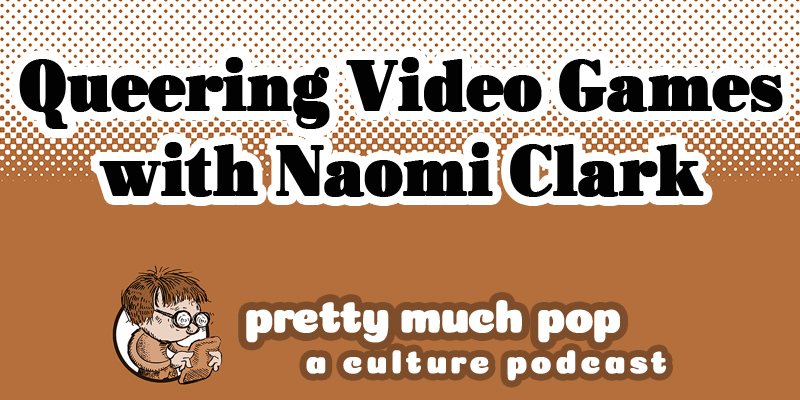
While LGBTQ+ representation in video games has been improving (as with other media), Naomi Clark (who designed games for LEGO, Gamelab, Fresh Planet, Rebel Monkey, et al) has something more disruptive in mind when arguing for game “queerification.” The prototypical video game includes a more-or-less linear progression through a pre-defined story to a defined win condition, and anything that challenges that tradition to allow more self-expression is a step in the direction of queering. Many popular games now include a sandbox aspect that allows players to make their own decisions, and this gestures at a continuum of freedom in player-game relations, with the extreme being a game that just provides a platform for players to create their own games.
Your host Mark Linsenmayer and guest co-host Tyler Hislop engage Naomi about topics like how games train us, character creation, glitches, speed runs, gamifying tasks, and economic and industry pressures in game design. Some games we touch on include The Sims, The Last of Us, Cyberpunk, and Mass Effect.
Read Naomi’s presentation on “Queering Human-Game Relations.” Get involved with the NYU Gamecenter where Naomi works. You can also play her early game Sissyfight 2000 free online. A couple of her other creations that come up in our discussion include Wonder City and the card game Consentacle. Read her wisdom on Quora and follow her on Twitter @metasynthie.
Some sources reviewed to prepare for this episode include:
- “Just Making Things and Being Alive About It: The Queer Games Scene” (2013) by Brendan Keogh
- “The 15 Queerest Video Games, Ranked” by Alley Hector (2018)
- “How Video Games Can Help LGBTQ+ Players Feel Like Themselves” by Laken Brooks
- “Press A, Be Gay: LGBTQ Representation in Video Games” by Jason Villemiz
- “15 Games With Non-Binary Friendly Character Creation” by Allison Stalberg
- “Can We Do Better Than Zelda? Queer Tropes in Video Games” a video from Feminist Frequency
- “The trans narrative in ‘The Last of Us Part II’ is compelling. There’s so much more to be done.” by Julie Muncy
- “‘Am I Trans?’: One Teen’s Quest and How Gaming Helped” (2015) from Note to Self podcast (which features Naomi)
- There are several specifically gay video game podcasts worth checking out, including Gay for Play and The Gayming Podcast.
This episode includes bonus discussion you can access by supporting the podcast at patreon.com/prettymuchpop. This podcast is part of the Partially Examined Life podcast network.
Pretty Much Pop: A Culture Podcast is the first podcast curated by Open Culture. Browse all Pretty Much Pop posts.
What Is “Queering” in Video Game Design? Naomi Clark on Pretty Much Pop: A Culture Podcast #103 is a post from: Open Culture. Follow us on Facebook and Twitter, or get our Daily Email. And don't miss our big collections of Free Online Courses, Free Online Movies, Free eBooks, Free Audio Books, Free Foreign Language Lessons, and MOOCs.
from Open Culture https://ift.tt/2YoMldX
via Ilumina
Comments
Post a Comment